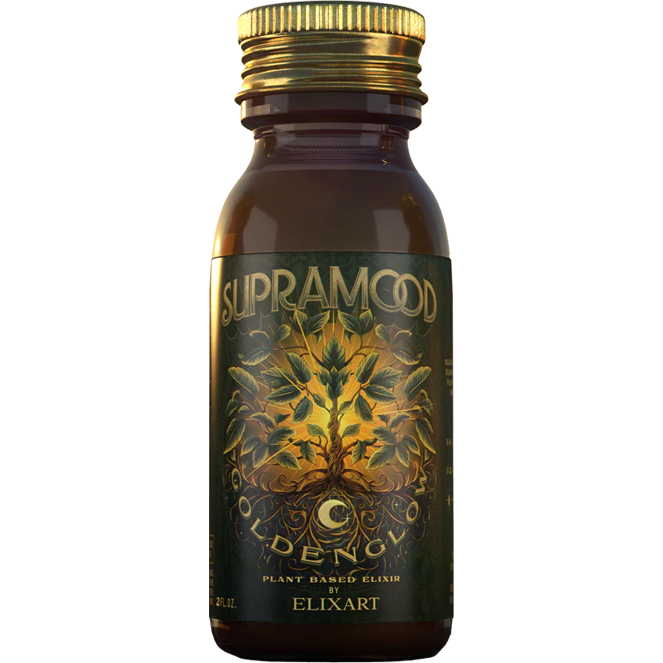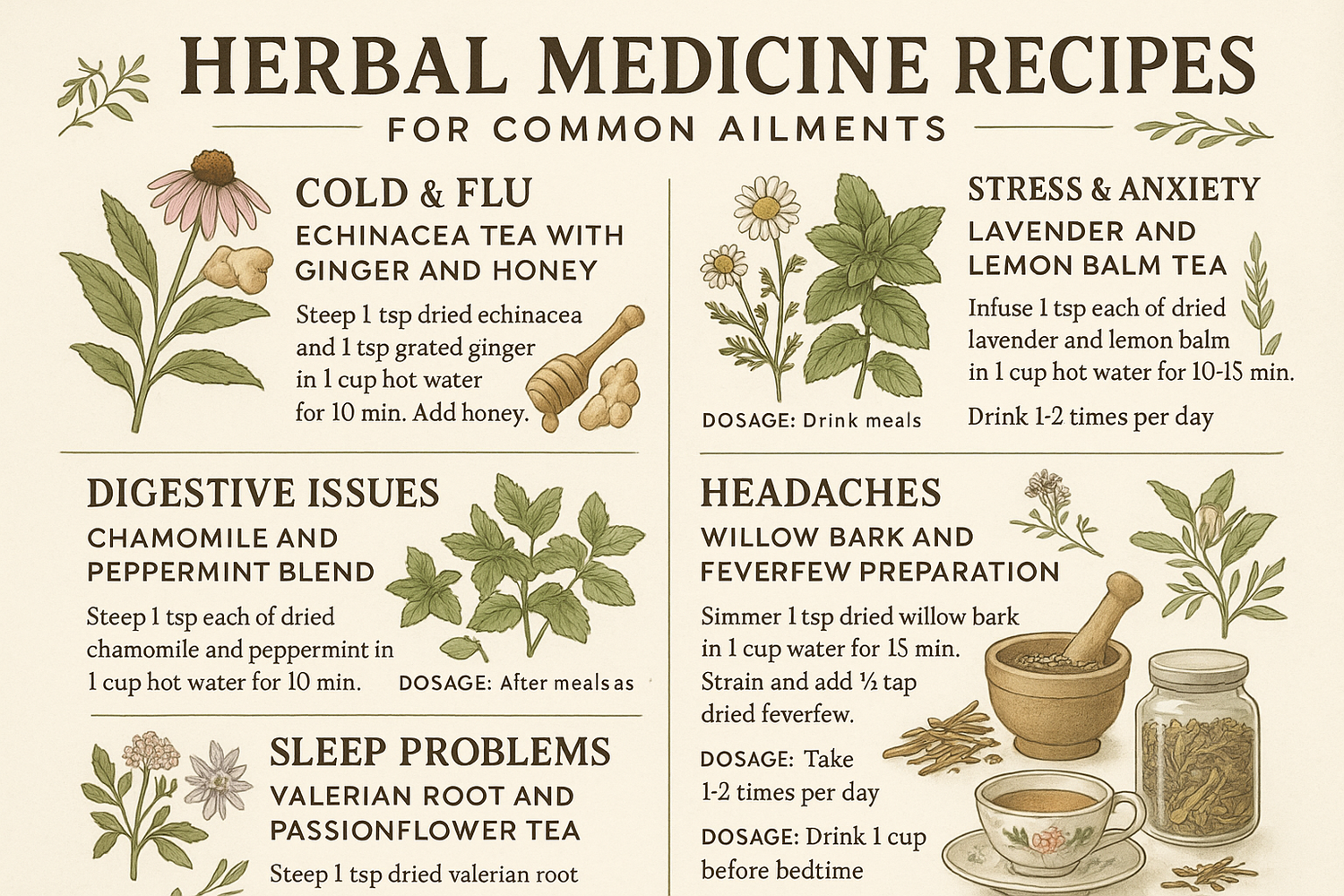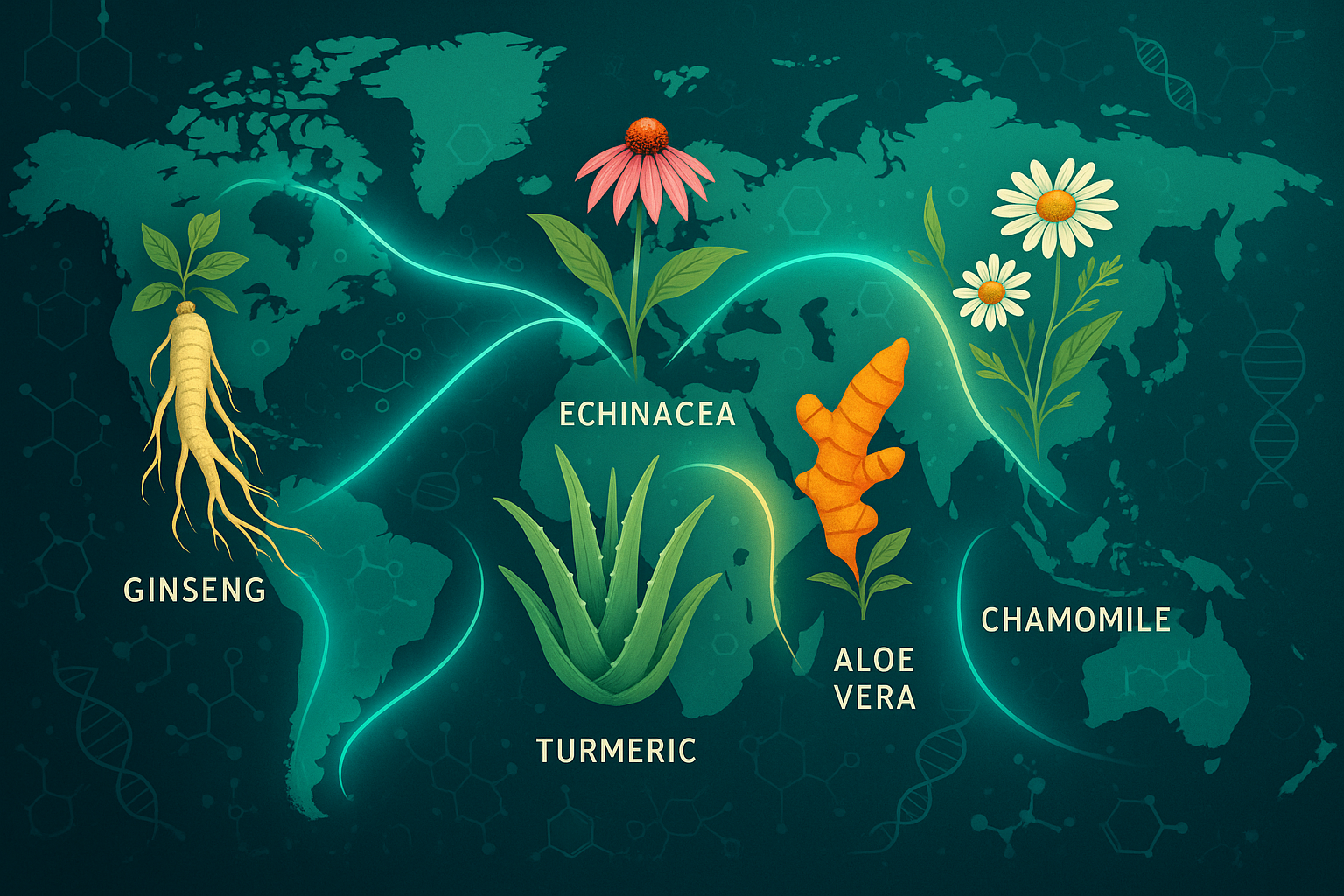Herbal medicine, which is the use of plants for medicinal purposes, has gained popularity for its ability to treat illness and improve overall health. By harnessing the natural properties of different herbs, you can effectively and safely address common health issues.
Using herbal medicine recipes for common ailments offers a holistic approach to health. These recipes are tailored to alleviate symptoms and support the body's natural healing processes. This natural method can often provide relief without the side effects associated with pharmaceutical drugs.
Benefits of Herbal Medicine
- Natural ingredients: Herbal remedies typically contain fewer synthetic chemicals than conventional medications.
- Holistic approach: Treats the whole person, not just the symptoms.
- Cost-effective: Often more affordable than prescription medications.
Risks of Herbal Medicine
- Potential side effects: Some herbs can cause adverse reactions.
- Interactions with other medications: Herbs may interact with prescribed drugs, potentially leading to complications.
- Quality concerns: Not all herbal products meet high standards for purity and potency.
It is important to consult with a qualified practitioner. A healthcare professional can help verify that herbal treatments are appropriate for your specific condition and ensure that they do not interact negatively with other treatments you may be receiving.
Understanding Herbal Medicine
Definition and Concept of Herbal Medicine
Herbal medicine involves using plants for their medicinal properties to treat various diseases and promote overall health. These treatments often use different parts of the plant such as leaves, roots, flowers, and seeds.
History and Cultural Significance of Herbal Medicine
Herbal medicine has a long history that goes back thousands of years:
- Ancient Egypt: The Ebers Papyrus, an Egyptian medical document from 1550 BC, lists over 700 plant-based remedies.
- Traditional Chinese Medicine (TCM): Uses herbs like Ginseng and Dong Quai for holistic healing.
- Ayurveda: An ancient Indian system that integrates herbal treatments like Turmeric and Ashwagandha.
How Herbal Medicine Works in the Body
Herbs contain active compounds that interact with the body's systems:
- Antioxidants: Neutralize harmful free radicals.
- Anti-inflammatory agents: Reduce inflammation and pain.
- Adaptogens: Help the body resist stressors of all kinds.
Commonly Used Herbs in Herbal Medicine
Several herbs are frequently used due to their therapeutic properties:
- Echinacea: Boosts the immune system.
- Dong Quai: Balances hormones and supports reproductive health.
- Ginkgo Biloba: Enhances cognitive function and circulation.
- Ginseng: Increases energy levels and reduces fatigue.
- St. John's Wort: Alleviates symptoms of depression.
Understanding these foundational aspects can help you appreciate the role herbal medicine plays in modern healthcare practices.
Using Herbal Medicine Recipes for Common Ailments
Opting for herbal medicine recipes can be highly beneficial when dealing with common ailments. The medicinal use of plants offers a natural approach to health, aiming to bring the body back to a state of natural balance. Here are some key advantages:
Benefits of Using Herbal Medicine for Common Ailments
- Fewer Side Effects: Herbal remedies generally have fewer side effects compared to conventional medications. Plants like Echinacea and Ginkgo Biloba are known for their mild profiles.
- Cost-Effectiveness: Many herbal remedies are more affordable than prescription drugs. Creating your own remedies at home can save money and reduce dependency on pharmaceuticals.
- Accessibility: Herbal ingredients are often easier to obtain. Many can be grown in your garden or purchased from health food stores.
Several benefits come with choosing herbal remedies over conventional treatments:
- Holistic Approach: Herbal medicine considers the whole person rather than just treating symptoms. This holistic perspective includes physical, emotional, and spiritual well-being.
- Preventive Care: Regular use of certain herbs can help prevent illnesses. For instance, Garlic is often used to boost the immune system and prevent colds.
- Sustainability: Using plant-based treatments is more environmentally friendly. Growing your own herbs reduces the carbon footprint associated with pharmaceutical production.
Holistic health plays a crucial role in maximizing the benefits of herbal medicine recipes. This approach emphasizes:
- Balanced Lifestyle: Combining herbal treatments with a balanced diet, regular exercise, and adequate sleep enhances their effectiveness.
- Mental Well-being: Stress management techniques such as meditation or yoga complement the use of herbal remedies like St. John's Wort, which is known for its mood-stabilizing properties.
- Personalized Care: Individual needs vary; what works for one person might not work for another. Consulting with a qualified practitioner ensures that you receive personalized recommendations tailored to your specific health concerns.
Using herbal medicine recipes for common ailments provides a natural, holistic alternative to conventional treatments. This approach supports overall well-being by addressing both physical symptoms and underlying causes, making it a valuable addition to any health regimen.
Precautions and Considerations when Using Herbal Medicine Recipes
Understanding the Right Dosage and Preparation Methods
When using herbal medicine recipes for common ailments, it's important to know the correct dosage and preparation methods. Herbs have powerful substances that can greatly impact your body. If you get the amount or method of preparation wrong, it can result in:
- Treatment not working
- Harmful side effects
To prevent these issues, always remember these guidelines:
- Dosage: Stick to recommended amounts to avoid poisoning.
- Preparation: Each herb has its own way of being prepared like turning it into tea, tincture or capsule. For instance, this study outlines specific guidelines for herbal processing which can be helpful in determining the appropriate preparation method.
Guidelines for Identifying and Selecting Quality Herbs for Homemade Remedies
Choosing good quality herbs is crucial for effective treatment. Here are some tips to ensure you pick the best:
- Source: Buy herbs from trusted sellers who share details on where they come from and how they're checked for quality. The World Health Organization provides comprehensive guidelines on herbal processing which could aid in identifying reputable sources.
- Form: Go for whole herbs instead of powders because they keep more of their natural properties. This beginner's guide to fresh herbs and spices offers valuable insights on the benefits of using whole herbs.
- Storage: Store herbs in a cool, dry spot that's not exposed to sunlight so they stay potent.
By understanding these precautions, you can make sure that your herbal medicine recipes are both safe and effective for treating common ailments.
Common Herbs for Common Ailments
1. Echinacea
Echinacea is widely recognized for its ability to boost the immune system. It is commonly used to prevent and treat colds and flu. The herb contains active substances that enhance the activity of the immune system, relieve pain, reduce inflammation, and have antiviral and antioxidant effects.
2. Dong Quai
Often referred to as "female ginseng," Dong Quai is primarily used in traditional Chinese medicine to treat menstrual cramps, menopausal symptoms, and anemia. Its natural balance of compounds helps to improve blood circulation and alleviate pain.
3. Garlic
Garlic is not just a culinary staple but also a potent medicinal plant. It is known for its ability to lower blood pressure, reduce cholesterol levels, and act as an anti-inflammatory agent. Garlic's antimicrobial properties make it effective against various infections.
4. Ginger
Ginger is a powerful remedy for gastrointestinal issues such as nausea, indigestion, and motion sickness. It has anti-inflammatory properties that can help reduce muscle pain and soreness. Additionally, ginger enhances digestion by stimulating saliva and bile production.
5. Ginkgo Biloba
Ginkgo Biloba is renowned for its cognitive-enhancing abilities. It improves blood flow to the brain and acts as an antioxidant. This herb is often used to treat conditions related to cognitive decline such as Alzheimer’s disease and dementia.
6. Ginseng
Ginseng is celebrated for its adaptogenic properties, which help the body resist stressors. It boosts energy levels, enhances mental clarity, and supports immune function. Ginseng is also known to improve mood and physical endurance.
7. St. John's Wort
St. John's Wort is commonly used as a natural remedy for depression and anxiety. Its active ingredient, hypericin, helps regulate mood by increasing levels of serotonin in the brain. The herb also has antibacterial properties that can aid in wound healing.
Understanding these herbs' benefits allows you to incorporate them into your herbal medicine recipes effectively for common ailments like colds, digestive issues, or mental fatigue. Always consult a healthcare professional before starting any new treatment regimen.
Ensuring Safety: Precautions, Side Effects, and Interactions
Importance of Not Self-Diagnosing Ailments
Self-diagnosing ailments can lead to improper treatments and potentially worsen health conditions. Consulting a qualified practitioner ensures you receive an accurate diagnosis and appropriate herbal medicine recommendations. Professional guidance helps tailor remedies to your specific needs, considering individual health factors that might be overlooked in self-diagnosis.
Potential Side Effects of Herbal Medicines
Herbal medicines, though natural, can still produce side effects. These side effects vary depending on the herb and the individual's body:
- Echinacea: May cause allergic reactions in some people.
- Ginkgo Biloba: Possible gastrointestinal upset or headaches.
- St. John's Wort: Can cause photosensitivity leading to skin issues.
Awareness of these potential side effects is crucial for safe use.
Interactions with Other Medications
Herbal medicines can interact with prescription drugs, altering their effectiveness or causing harmful reactions. Some common interactions include:
- St. John's Wort: Reduces the efficacy of birth control pills and antidepressants.
- Ginkgo Biloba: Increases bleeding risk when taken with anticoagulants like aspirin or warfarin.
Taking precautions when using herbal medicines involves consulting healthcare professionals about possible interactions with current medications. This step is essential to prevent adverse effects and ensure holistic health management.
Buying Guide: Choosing and Sourcing Herbal Medicine Products
Purchasing herbal medicine products from reputable suppliers ensures the quality and efficacy of the herbs you use. Not all suppliers adhere to stringent quality control standards, making it critical to select those with a proven track record.
Tips for Choosing Reliable Herbal Medicine Suppliers
- Research the Supplier's Reputation: Look for reviews and testimonials from other consumers. Check if the supplier is certified by recognized health authorities.
- Verify Quality Standards: Ensure the supplier follows good manufacturing practices (GMPs) and sources herbs organically when possible.
- Check Ingredient Transparency: Reputable suppliers should clearly list all ingredients and their concentrations, along with any potential allergens.
- Seek Third-Party Testing: Look for products that have been tested by independent labs to confirm purity and potency.
The Role of Healthcare Professionals
Consulting healthcare professionals can guide you in selecting appropriate herbal medicines. They offer:
- Personalized Recommendations: Tailored advice based on your health history and current medications.
- Safety Assurance: Information on potential interactions with prescribed medications, ensuring safe usage.
Healthcare professionals can help you navigate the complexities of herbal medicine, making sure you benefit from its holistic health properties without compromising safety. This collaboration enhances your confidence in using herbal remedies effectively.
Conclusion
Herbal Medicine Recipes for Common Ailments offer a natural alternative to conventional treatments. They have the potential to restore balance and improve overall well-being.
- If you're interested in using herbal medicine, it's important to consult with a professional. They can provide personalized recommendations based on your specific health needs and ensure that you're using herbs safely and effectively.
These recipes do more than just alleviate symptoms; they promote holistic health by supporting the body's natural balance. By incorporating these remedies into your daily routine, you're taking steps towards long-term wellness and preventive care.
When it comes to herbal medicine, it's crucial to approach it in a balanced way under the guidance of experts. This includes prioritizing safety, seeking high-quality products, and relying on professional advice for optimal results.
Used responsibly, herbal medicine can be a valuable tool for maintaining well-being and addressing common ailments.
FAQs (Frequently Asked Questions)
What is the definition and importance of herbal medicine?
Herbal medicine is the medicinal use of plants, and it is important because it offers natural remedies for common ailments and contributes to holistic health.
How does herbal medicine work in the body?
Herbal medicine works by utilizing the active ingredients in plants to restore natural balance and address common ailments.
What are the advantages of opting for herbal remedies over conventional treatments?
Using herbal remedies for common ailments offers benefits such as supporting holistic health and minimizing potential risks associated with conventional treatments.
What precautions should be considered when using herbal medicine recipes?
It is important to understand the right dosage and preparation methods, as well as to identify and select quality herbs for homemade remedies. Consulting a qualified practitioner is also crucial.
What are the potential side effects of herbal medicines?
Potential side effects of herbal medicines should be considered, and interactions with other medications should be carefully monitored. It is important not to self-diagnose ailments and always consult a qualified practitioner.
Why is it important to purchase herbal medicine products from reputable suppliers?
Purchasing herbal medicine products from reputable suppliers ensures quality and safety. Healthcare professionals can also provide guidance in choosing reliable herbal medicine products.







Leave a comment
This site is protected by hCaptcha and the hCaptcha Privacy Policy and Terms of Service apply.